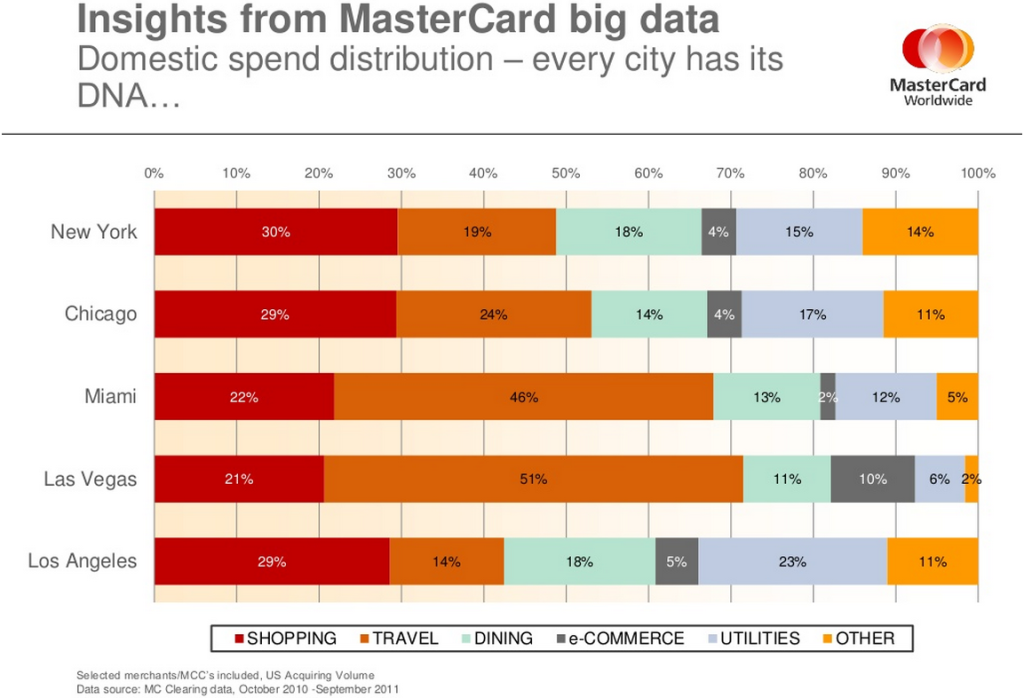MasterCard Helps Retailers Perform Better with Big Data

It may be obvious that the massive credit card company Mastercard is heavily involved in big data. They have over 1.9 billion credit cards world wide that do over 65 billion transactions per year. They have over 32 million online and offline merchants that accept credit cards from Mastercard and 22.000 issuers and their credit cards are accepted in 210 countries. They use 700.000 rules to automatically clean, aggregate and augment their over 10 Petabytes of data. Apart from of course preventing fraudulent behaviour and identifying and preventing fraudulent transaction before they occur, Mastercard applies big data in another innovative way. It knows what everyone buys and they are using big data techniques to offer reports, insights, customer information and forecasts to their merchants.
The data that MasterCard obtains is however still not yet ready to use. With each transaction they receive data regarding the amount of the transaction, the merchant name, the time, date and the credit card number. They then strip the account number and make the data anonymous, according to Gary Kearns, group executive for the company's information services business in an article on ZDNet. However the problem is that the data obtained is messy as the name of the merchant on a point-of-sale machine is a free-text field, resulting in many different names for the same merchants, retail chains or businesses. In the past years MasterCard has worked on creating the rules, algorithms and engines to clean such data and make it usable.
As a result MasterCard most-funded big data startups currently. Together they will offer joint products using MasterCard's databases and Mu Sigma's analytics technology.
One of such products is that MasterCard decided to sell specific customer segment information to its merchants. Of course, as all personal identifiable information is stripped, no private information is shared, but specifically it sells information on detailed customer segments and spending patterns. MasterCard crunches all the data that it can get its hands on, including over five years of historical data, and consequently creates segments about customers that are loyal to a certain product category or store or on other specific patterns. This provides great insights. A nice example is that the data shows that every city has its own spending DNA as the below image from a presentation by Gary Kearns shows:

Based on the transaction data MasterCard can create very detailed segments of its customers. Something bought at a music store for example could reveal that the person is a musician. Regular restaurant payments reveal that the person enjoys dining and going out. This type of information helps MasterCard as well as its merchants to better understand its customers and create 360 degrees views in real-time based on customer spending.
MasterCard has big plans with its data as can be shown by the recent opening of an Advanced Analytics Centre of Excellence in India. This data centre helps MasterCard to even better analyse global spending trends, an important key differentiator for MasterCard. Gary Kearns explained to PYMNTS that one of the centre's key missions is to monetize its data and better deliver "unique solutions" and "actionable insights.”
For MasterCard, big data is big business and with all their data at hand they are helping merchants gain better insights and more revenue while in the mean time grow their own business. Real-time data and analytics have a big impact on MasterCard’s merchants and MasterCard can help them find previously hidden opportunities. At the World Retail Congress Asia Pacific 2013, Andy Mantis, group head of Business Solutions, MasterCard Advisors shared some insights regarding this innovative big data approach. To read more about how MasterCard thinks of big data, head over to their big data blogs.





